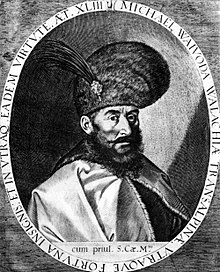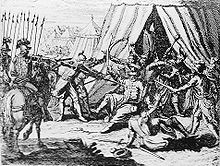Mihai Viteazul
Mihai Viteazul (Michael the Brave) (* 1558 in Târgul de Floci ; † August 9, 1601 in Câmpia Turzii ) was voivode of Wallachia (1593-1601), Transylvania (1599-1600) and Moldova (1600). He is one of the Romanian national heroes, as he united the three principalities that are now part of Romania under his rule for the first time for four months.
Life
Michael was born in 1558 to Teodora Cantacuzino. The year of birth results from the note on a painting that was made by Egidius Sadeler the Elder in Prague in 1601 and in which Michael is referred to as aetatis XLIII , i.e. 43 years old. His mother, who came from the famous Cantacuzino family , was a Greek phanariot . His father is unknown. For a long time, the voivode of Wallachia Petraschku the Good (Rum .: Pătraşcu cel Bun) was assumed to be the father, but this long-standing thesis was refuted in the 20th century by the historian Petre P. Panaitescu. The main argument was that Petrashku died in 1557 and had been terminally ill for a long time before that. Târgul de Floci (German: Wollmarkt) is believed to be the place of birth, a city that has since vanished and was located in the east of Wallachia on the lower Danube.
In 1588 he became Ban of Mehedinți , in the same year Stolnic (Commissioner) at the court of Mihnea Turcitul , and in 1593 Ban of Craiova . At that time, Wallachia was ruled by Alexandru cel Rău . In September 1593 he became voivode of Wallachia with the help of the Ottomans and took office on October 11th.
In 1594, at the beginning of the so-called Long Turkish War (1593-1606), he briefly joined the anti-Ottoman league with Sigismund Báthory of Transylvania and Aron Vodă , the Voivode of Moldova. In the autumn of 1595 he began a campaign against the Ottomans and briefly took some fortresses near the Danube , including the strong garrison Giurgiu , Cetatea de Floci, Hârșova and Silistra .
In 1595 he or his envoys in Alba Iulia concluded a contract (which was extremely detrimental to Mihai) with Sigismund Bathory, in which he reactivated the formal vassalage of Wallachia from remaining Hungary (and in its successor to the Principality of Transylvania) and in return got military support.
On August 13, 1595 there was a victorious battle between Mihai's contingent and a large army (approx. 40,000 men) led by Grand Vizier Koca Sinan Pasha at Călugăreni near the Neajlov River . Nevertheless, Mihai (like Mircea cel Bătrân before ) had to retreat to the mountains because Sigismund Bathory and his troops were late. Of the 17,000 Mihais, around 1,200 Wallachians fell at Călugăreni, and the Ottomans lost around 3,000 men. The Ottomans were pushed back across the Danube, Sinan Pascha narrowly escaped death. Together with Prince Sigismund Bathory, he won a second victory over the Ottomans in October of that year.
On October 18, 1599, Mihai, as an ally of the Habsburgs, won an important victory in the Battle of Schellenberg against Cardinal Andreas Báthory , who had briefly taken over Transylvania from his cousin Sigismund Bathory in 1599. In the princely residence city in Weissenburg ( Alba Iulia ), he had the keys of the city handed over to him by the Catholic Bishop Naprágy. A union of Transylvania with Wallachia was not planned by the Habsburgs, but was carried out by Mihai in order to consolidate his claim to Transylvania. There were already plans (1597) for a conquest of the Principality of Moldavia planned by him, but these were postponed at the urging of Sigismund Bathory. Instead, efforts were made to remove Transylvania from the sphere of influence of the Poles, who were friends with the Ottomans at the time. Mihai named himself afterwards (there are seals or documents / resolutions from this time) Mihai voivod din mila lui Dumnezeu Domn al Țării Ungrovlachei Ardealului și Moldova . He ruled as governor of the Habsburg emperor Rudolf II , who was also the Hungarian king.
In May 1600, after the conquest of Transylvania, a Wallachian contingent under the command of Mihai conquered the Moldova and drove out the local voivode Ieremia Movilă , who maintained friendly relations with Poles and Turks. Movilă fled to Poland. The Hungarian nobleman Mozses Székely and a son of Mihais served as voivodes between May and September 1600. Mihai's rule, which was dependent on imperial subsidies, collapsed in the autumn of 1600 when Polish armies under the chief crown hetman Jan Zamoyski and his Moldovan and Wallachian pretenders conquered Moldova and Wallachia , in connection with a Habsburg army under Georg Basta Mihai near Mirăslău ( ung. Miriszló ) defeated and driven out of the country. After a reconciliation between the now landless Mihai and Rudolf II in Prague in 1601, he was sent to the Carpathian Basin as an imperial vassal together with Georg Basta for a new campaign. Mihai was supposed to regain Wallachia and Transylvania as he was the only one who could restore the old situation. Together they defeated the contingent of the Transylvanian estates and Prince Sigismund Bathory at Guruslau / Gorószló on August 3, 1601. A few days later in Jerischmarkt = Câmpia Turzii , Michael the Brave was ordered by the Habsburg military leader Georg Basta (who was in fierce competition with Mihai stood and considered him politically dangerous) murdered.
Individual evidence
- ↑ Petre Panaitescu , Mihai Viteazul , Bucharest 2002 (new edition of the 1936 edition , with a foreword by Șerban Papacostea), p. 13.
- ↑ Nicolae Iorga , Istoria lui Mihai Viteazul (The Story of Michael the Brave), p. 14 ff.
- ↑ Petre Panaitescu , Mihai Viteazul , Bucharest 2002 (new edition of the 1936 edition , with a foreword by Șerban Papacostea), p. 16 ff.
literature
- Tudor Dinu : Mihai Viteazul, erou al eposului grec. Editura Humanitas, Bucharest 2008.
Web links
- Literature by and about Mihai Viteazul in the catalog of the German National Library
- Illustration by Mathias van Somer from 1665: Michael Weywodt from the Walachey ( digitized version )
See also
| predecessor | Office | successor |
|---|---|---|
| András Báthory |
Prince of Transylvania 1599 - 1600 |
Sigismund Báthory |
| personal data | |
|---|---|
| SURNAME | Viteazul, Mihai |
| ALTERNATIVE NAMES | Michael the Brave |
| BRIEF DESCRIPTION | Romanian voivode of Wallachia, Transylvania and Moldova |
| DATE OF BIRTH | 1558 |
| PLACE OF BIRTH | Târgul de Floci |
| DATE OF DEATH | August 9, 1601 |
| Place of death | Câmpia Turzii |


